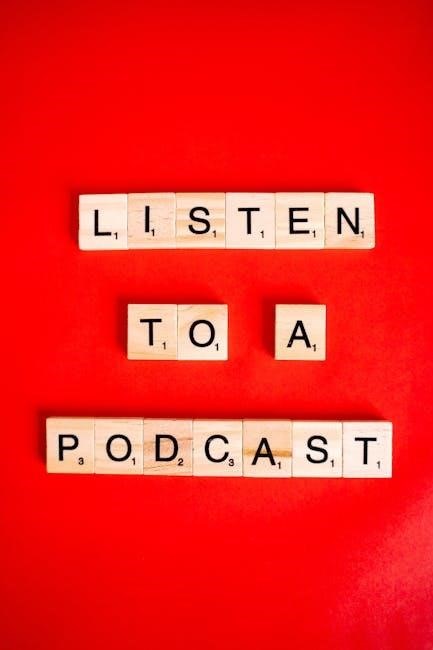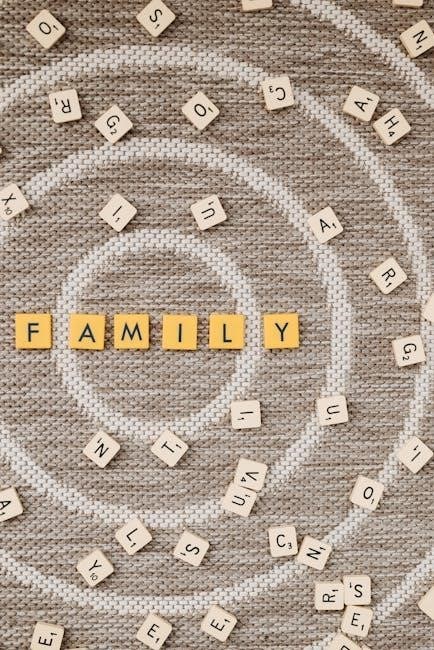Third-grade spelling words introduce students to foundational vocabulary and patterns․ These 200 essential words‚ including Dolch sight words‚ are integrated into various subjects and activities․ Printable PDF lists available․
1․1 Importance of Mastering Spelling Skills in 3rd Grade
Mastering spelling skills in 3rd grade is crucial for building strong literacy foundations․ It enhances reading fluency‚ writing confidence‚ and vocabulary development․ Spelling proficiency helps students decode and encode words accurately‚ fostering better comprehension in various subjects․ As 3rd graders encounter more complex texts‚ spelling mastery ensures smoother transitions and improved academic performance․ Regular practice with PDF resources and structured activities reinforces these skills‚ preparing students for future challenges in education․
1․2 Overview of the 3rd Grade Spelling Curriculum
The 3rd grade spelling curriculum focuses on 200 essential words‚ including sight words‚ academic vocabulary‚ and word patterns․ It emphasizes long vowels‚ consonant blends‚ and multi-syllable words․ The curriculum is structured to help students recognize spelling patterns and improve fluency․ Resources like printable PDFs provide weekly lists‚ activities‚ and dictation exercises․ These tools align with Common Core standards‚ ensuring comprehensive practice and mastery of foundational spelling skills․

Sight Words for 3rd Grade
Sight words are high-frequency words that students recognize instantly․ Third graders learn Dolch sight words like save‚ school‚ and father‚ essential for fluent reading and writing․
2․1 Definition and Role of Sight Words
Sight words are high-frequency words that appear commonly in texts but often don’t follow phonetic rules‚ making them challenging to decode․ They are recognized by sight rather than sounded out․ These words are foundational for fluent reading and writing‚ as they make up a significant portion of everyday language․ For third graders‚ mastering sight words like “save‚” “school‚” and “father” is crucial for building reading confidence and speed․ They are often introduced through Dolch lists‚ which categorize words by grade level to align with learning goals․ Sight words are essential for literacy development‚ enabling students to focus on comprehension rather than decoding individual words․
2․2 Examples of High-Frequency Sight Words
High-frequency sight words are common in everyday reading and writing․ Examples for 3rd graders include family‚ school‚ mother‚ father‚ happy‚ friends‚ teacher‚ student‚ read‚ write‚ and learn․ Additional words like play‚ share‚ care‚ help‚ kind‚ thank‚ please‚ excuse‚ and sorry are also essential․ These words are chosen because they appear frequently in texts and are vital for building reading fluency and confidence․ Mastering them helps students recognize and spell common words effortlessly․
2․3 Dolch Sight Words for 3rd Grade
Dolch Sight Words are a key part of spelling education․ For 3rd graders‚ examples include about‚ again‚ always‚ around‚ because‚ and been․ These words are chosen for their high frequency in texts and irregular spelling patterns․ There are 41 Dolch Sight Words for 3rd grade‚ focusing on common‚ non-phonetic words that students should memorize․ Mastering these words enhances reading fluency and spelling accuracy‚ as they often appear in everyday reading materials and are essential for academic success․

Word Patterns and Spelling Rules
This section introduces essential word patterns and spelling rules‚ such as word families and common suffixes‚ to enhance spelling skills in 3rd graders․
3․1 Long Vowel Patterns (e․g․‚ a/e‚ i/e‚ o/e)
Long vowel patterns are essential for 3rd graders to recognize and spell words correctly․ These patterns involve silent e at the end of words‚ such as cake or bite․ Students learn to identify a/e‚ i/e‚ and o/e patterns‚ which help in decoding unfamiliar words․ For example‚ make and like follow the a/e and i/e rules‚ respectively․ Mastering these patterns enhances spelling accuracy and reading fluency‚ as they are common in many English words․
3․2 Consonant Blends and Digraphs
Consonant blends and digraphs are crucial for accurate spelling in 3rd grade․ Blends‚ like bl in black or tr in tree‚ combine two consonants smoothly․ Digraphs‚ such as sh in ship or ch in chat‚ represent a single sound․ Students learn to identify and spell these patterns‚ enhancing their ability to decode and write complex words․ Mastering blends and digraphs improves reading fluency and spelling confidence‚ as they appear frequently in everyday words․
3․3 Irregular and Tricky Words
Irregular and tricky words are spelling exceptions that don’t follow standard rules․ These words‚ like because‚ friend‚ and island‚ often confuse students due to silent letters or unexpected letter combinations․ Mastering these words requires memorization and practice․ Teachers and parents can use flashcards‚ word searches‚ or writing exercises to help students commit these words to memory․ Regular review and repetition are key‚ as these words are essential for building strong spelling and reading skills in 3rd grade․

Academic Vocabulary for 3rd Grade
Academic vocabulary includes complex words students encounter in subjects like science and social studies․ These terms are essential for comprehension and effective communication in classroom settings․
4․ Related to Science and Social Studies
Academic vocabulary for 3rd grade includes words from science and social studies that enhance students’ understanding of these subjects․ Science-related words like habitat‚ fossil‚ and photosynthesis introduce key concepts․ Social studies terms such as community‚ culture‚ and geography help students grasp societal and historical contexts․ These words are often included in spelling lists to reinforce their importance in broader academic learning‚ ensuring students can spell and use them confidently in assignments and discussions․ Mastering these terms supports both spelling proficiency and subject knowledge․
4․2 Vocabulary Building Strategies
Effective vocabulary building strategies for 3rd graders include using flashcards‚ interactive word games‚ and hands-on activities․ Incorporating new words into sentences helps students understand context and usage․ Reading aloud and group discussions also enhance comprehension and retention․ Visual aids like word walls and diagrams can make learning engaging․ Encouraging daily practice through worksheets and quizzes reinforces spelling and meaning․ These strategies create a well-rounded approach to expanding vocabulary while making learning fun and interactive for young students․

Printable Resources for 3rd Grade Spelling
Printable resources for 3rd grade spelling include worksheets‚ activities‚ and exercises designed to help students practice and master their spelling skills through engaging and interactive learning․
5․1 Free PDF Worksheets and Activities
Free PDF worksheets and activities are excellent tools for reinforcing spelling skills in 3rd graders․ These resources often include word searches‚ crossword puzzles‚ and practice exercises tailored to specific spelling lists․ Many worksheets focus on common spelling patterns‚ such as long vowels or consonant blends‚ while others incorporate seasonal or thematic designs to make learning engaging․ Parents and educators can easily download and print these materials‚ providing students with interactive and visually appealing ways to practice their spelling abilities at home or in the classroom․
5․2 Weekly Spelling Lists in PDF Format
Weekly spelling lists in PDF format provide structured and organized practice for 3rd graders․ These lists typically include 10–‚ often aligned with curriculum standards or thematic units․ Many PDFs feature definitions‚ sentences‚ or activities to enhance learning․ Teachers and parents can download and print these lists‚ making them a convenient tool for weekly spelling practice․ Some resources also include interactive elements like word matching or fill-in-the-blank exercises‚ ensuring engaging and effective spelling reinforcement for students․

Interactive Spelling Games and Activities
Engage students with fun spelling games like word scrambles‚ crossword puzzles‚ and interactive quizzes․ Hands-on activities such as spelling bingo and word-building competitions make learning exciting and effective․
6․1 Online Games for Practicing Spelling
Online games offer an engaging way for students to practice spelling․ Popular platforms include Spelling City and Coolmath Games‚ which feature interactive activities like word searches‚ crossword puzzles‚ and drag-and-drop exercises․ Many games are designed specifically for 3rd graders‚ with timed challenges and rewards to keep students motivated․ These tools often allow teachers or parents to input custom spelling lists‚ ensuring alignment with curriculum goals․ Additionally‚ educational websites like ABCmouse and Education․com provide a variety of spelling games that cater to different learning styles․
These online resources make spelling practice fun and accessible‚ helping students build confidence and fluency in a supportive environment․
6․2 Hands-On Activities for Engaging Learning
Hands-on activities make spelling practice interactive and enjoyable for 3rd graders․ Using letter tiles or magnetic letters‚ students can build and rearrange words to reinforce recognition․ Another idea is creating word cards and having students sort or match them in games like “Word Bingo” or “Scrabble Jr․” Writing spelling words in shaving cream or sand provides a tactile experience‚ while arts-and-crafts projects‚ like decorating letters or forming words with playdough‚ blend creativity with learning․ These activities keep students engaged and make spelling practice fun and memorable․
Group activities‚ such as word-building relays or spelling scavenger hunts‚ encourage teamwork and active participation‚ making learning dynamic and effective․

Assessments and Progress Tracking
Assessments and progress tracking are crucial for measuring spelling mastery․ Regular spelling tests‚ quizzes‚ and dictation exercises help evaluate retention and identify areas needing review․ Tracking progress through checklists or portfolios provides insights into improvement and informs instruction․
7․1 Spelling Tests and Quizzes
Spelling tests and quizzes are essential tools for evaluating student progress․ Conducted weekly or bi-weekly‚ these assessments focus on mastery of assigned word lists․ They help identify areas where students may need additional practice․ Tests often include both written and oral components to ensure comprehension and fluency․ Interactive quiz formats‚ such as flashcard games or digital apps‚ can make these assessments engaging․ Immediate feedback allows students to correct mistakes and reinforces learning․ Regular quizzes also build confidence and prepare students for more advanced spelling challenges․
7․2 Dictation Exercises for Fluency
Dictation exercises are a powerful tool for improving spelling fluency․ Teachers read words aloud‚ and students write them down‚ focusing on accuracy and speed․ This method enhances listening skills and reinforces spelling patterns․ Regular dictation helps students apply spelling rules in context and builds confidence․ It also identifies areas where students need extra practice․ Over time‚ increasing the difficulty of dictated words challenges learners and refines their mastery of 3rd-grade spelling words․ This engaging approach makes learning interactive and effective for long-term retention․

Tips for Parents and Teachers
Use interactive resources like 3rd-grade spelling word PDFs to make learning fun․ Encourage consistent practice‚ celebrate progress‚ and integrate spelling into daily routines for better retention․
8․1 Effective Strategies for Teaching Spelling
Use interactive 3rd-grade spelling word PDFs to engage students with activities like word searches and crossword puzzles․ Break words into patterns to help students recognize common spellings․ Encourage repetition through writing exercises and flashcards․ Integrate multisensory approaches‚ such as tracing words or using visual aids․ Make practice routine by incorporating spelling into daily schedules․ Provide positive reinforcement and celebrate progress to build confidence․ Offer immediate feedback to correct mistakes and reinforce learning․
8․2 Encouraging Daily Practice at Home
Encourage daily practice with 3rd-grade spelling word PDFs by creating a consistent routine․ Parents can use flashcards or interactive PDFs to make learning fun․ Set aside 10-15 minutes daily for activities like writing words in sand or shaving cream․ Incorporate games‚ such as spelling bees or word searches‚ to keep it engaging․ Provide a list of words each week and offer rewards for progress․ Share creative methods like spelling in the air or using magnetic letters․ Positive reinforcement and parental involvement can significantly boost a child’s spelling confidence and mastery․
Advanced Spelling Challenges
Engage students with spelling bees and multi-syllable words like accommodate or celebrate․ Use 3rd-grade spelling word PDFs to introduce complex patterns and encourage advanced learners to explore challenging vocabulary․
9․1 Spelling Bee Words for 3rd Grade
Spelling bee words for 3rd graders often include challenging vocabulary like accommodate‚ celebrate‚ and authorize․ These words introduce advanced patterns such as silent letters and multi-syllables․ Practice with 3rd-grade spelling word PDFs to build confidence․ Use online tools or printable lists to focus on tricky spellings․ Encourage daily practice to master these complex words‚ fostering fluency and a stronger vocabulary foundation․ Spelling bees provide a fun‚ competitive way to test skills and prepare for higher-level competitions․ Start with simpler bee words and gradually introduce more difficult ones for steady progress․
9․2 Building Multi-Syllable Words
Building multi-syllable words is a key skill for 3rd graders‚ enhancing spelling and reading abilities․ Words like butterfly (but-ter-fly) or celebrate (cel-e-brate) demonstrate syllable division․ Teaching strategies include clapping syllables‚ identifying patterns‚ and using word families․ Printable PDF resources offer exercises to practice breaking down and constructing multi-syllable words․ Activities like word sorting and puzzles can make learning engaging․ Regular practice with these techniques helps students decode longer words confidently‚ preparing them for more complex vocabulary in higher grades․

Common Core Aligned Spelling Lists
Common Core aligned spelling lists for 3rd grade focus on phonological awareness‚ word patterns‚ and vocabulary growth․ Examples include words like celebrate‚ author‚ and victory‚ which align with grade-level standards․
10․1 Alignment with 3rd Grade Standards
Common Core aligned spelling lists for 3rd grade are designed to meet specific standards‚ focusing on phonics‚ word recognition‚ and vocabulary․ These lists emphasize decoding skills‚ such as identifying word patterns‚ prefixes‚ and suffixes․ Words like apply‚ analyze‚ and patterns align with standards that promote reading fluency and comprehension․ The lists also include multisyllabic words and vocabulary relevant to science and social studies‚ ensuring a well-rounded approach to spelling and language arts․ This alignment helps students build a strong foundation for future academic success․
10․2 Examples of Aligned Spelling Words
Examples of 3rd-grade spelling words aligned with Common Core standards include celebrate‚ authority‚ and dictionary․ These words focus on suffixes‚ prefixes‚ and multi-syllable structures․ Other examples are generate‚ cooperation‚ and environment‚ which emphasize word patterns and vocabulary building․ These words are selected to enhance phonics skills‚ fluency‚ and comprehension‚ ensuring students meet grade-level expectations․ They are often included in PDF spelling lists to provide structured practice and reinforcement of spelling concepts․

Thematic Spelling Lists
Thematic spelling lists engage students with seasonal and holiday-themed words‚ such as autumn‚ valentine‚ and halloween․ These lists make learning fun and relevant to real-life experiences․
11․1 Seasonal and Holiday-Themed Words
Seasonal and holiday-themed spelling lists make learning fun and engaging․ For example‚ words like valentine‚ halloween‚ and autumn connect spelling practice to real-life celebrations․ These lists often include words like pumpkin‚ snowflake‚ and decorations‚ tying spelling to festive activities․ Teachers can use these themes to create interactive lessons‚ such as spelling Christmas carols or Halloween-themed sentences․ This approach helps students practice spelling in a meaningful context‚ making it enjoyable and effective for retention․
11․2 Theme-Based Lists for Engaged Learning
Theme-based spelling lists create engaging learning experiences by focusing on specific topics․ For example‚ lists might center on animals‚ space‚ or community helpers․ Words like jungle‚ ocean‚ or planet align with students’ interests‚ making practice more enjoyable․ These lists often include words like spaceship‚ astronaut‚ or star for space themes․ Teachers can use these lists to connect spelling with other subjects‚ fostering a deeper understanding and love for learning through meaningful‚ topic-focused practice․
Mastering 3rd-grade spelling words is essential for building strong literacy skills․ With consistent practice and engaging resources‚ students can confidently progress and excel in their academic journey․
12․1 Summary of Key Spelling Concepts
Third-grade spelling focuses on mastering phonics‚ sight words‚ and word patterns․ Students learn long vowels‚ consonant blends‚ and irregular words․ Sight words‚ like their and because‚ are emphasized to improve fluency․ Word patterns such as -tion and -ent help build decoding skills; Academic vocabulary in science and social studies enhances understanding․ Regular practice with worksheets‚ games‚ and tests reinforces spelling mastery․ These concepts lay a strong foundation for advanced reading and writing abilities in later grades․
12․2 Encouragement for Continued Practice
Consistent practice is key to mastering 3rd-grade spelling words․ Encourage students to dedicate a few minutes daily to review and engage with spelling activities․ Celebrate progress‚ no matter how small‚ to build confidence․ Incorporate fun methods like spelling games or writing short stories to make practice enjoyable․ Remind them that spelling is a skill that improves with time and effort‚ fostering a lifelong love for learning and communication․